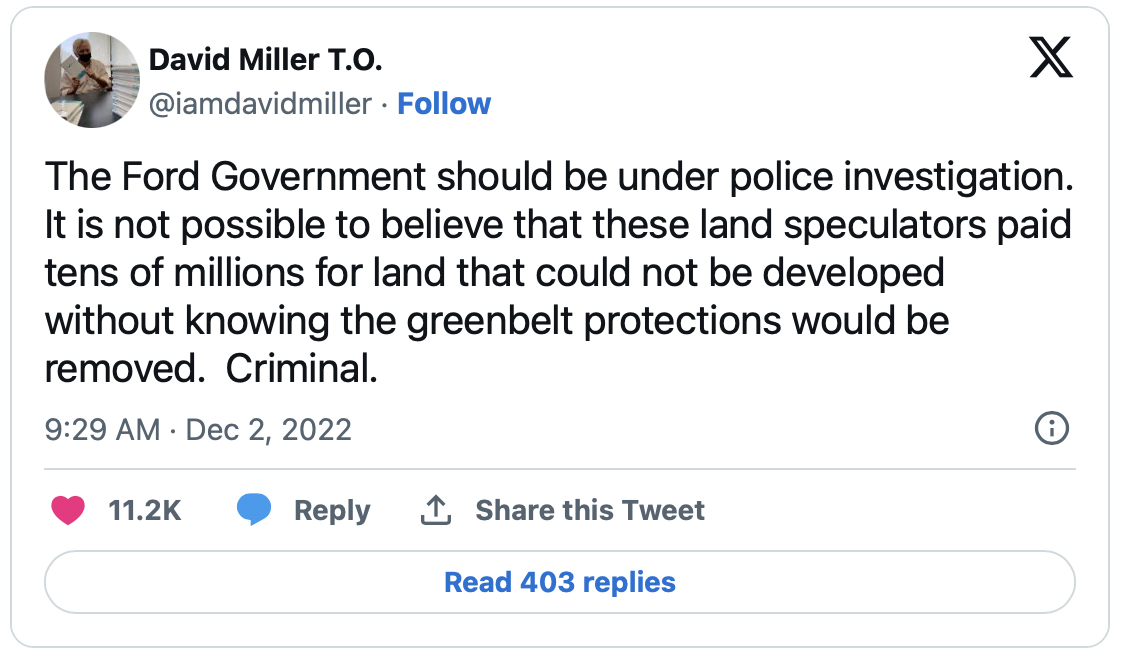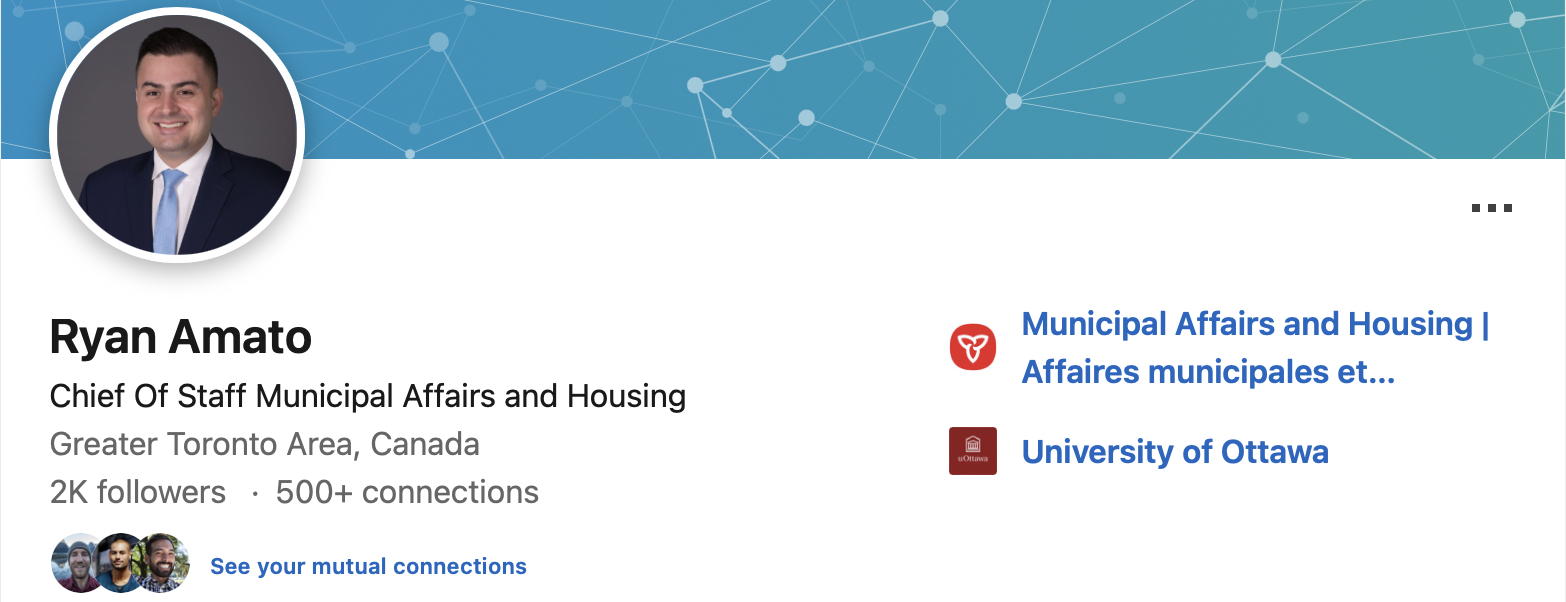The Greenbelt scandal is currently with the RCMP who are deciding whether to launch an investigation. 
Surely there can be no doubt now that the Police should investigate to determine if there have been breaches of the criminal law.
Was Ryan Amato – Clark’s former Chief of Staff – a rogue operator or was he doing his master’s bidding?
Clark insists he did not know what Amato was getting up to behind his back.
Clark, with his resignation as a Minister this morning, belatedly takes responsibility for the actions of his Chief of Staff. It is a bedrock constitutional principle that Ministers take responsibility for what is done in their name and they are answerable to Parliament.
Reprimand
The Ontario Legislature will consider the Integrity Commissioner’s report when it returns later this month. David Wake is recommending Clark be reprimanded. Clark’s resignation does not render the Integrity Commissioner’s report otiose.
Amato had implied authority. He could issue orders to public service staff only because he was acting on the Minister’s behalf. He had no authority in his own right.
In her special report on changes to the Greenbelt the Auditor General asked the Premier, in turn, to request the Integrity Commissioner, David Wake, to determine if Amato “acted contrary to the requirements of the Public Service of Ontario Act, 2006 with respect to his liaisons with land developers and their representatives.”
Wake is currently looking into this.
Breaking Rules
It is as plain as a pikestaff that Amato broke the rules. 
Section 6 of O.Reg.382/07 states:
6. (1) When performing his or her duties to the Crown, a public servant shall not give preferential treatment to any person or entity, including a person or entity in which the public servant or a member of his or her family or a friend has an interest.
(2) When performing his or her duties to the Crown a public servant shall endeavour to avoid creating the appearance that preferential treatment is being given to a person or entity that could benefit from it.
(3) A public servant shall not offer assistance to a person or entity in dealing with the Crown other than assistance given in the ordinary course of the public servant’s employment.
Corrupt
It is beyond dispute that the developers Michael Rice and Silvio de Gasperis received preferential treatment that will net them billions of dollars from a process that was totally corrupt.
The Auditor General told us that during her audit she came across examples of what appeared to be preferential treatment which
“included providing information about the ownership and purchasing of lands, setting up investment-opportunity meetings with Minister’s Office staff, and the consideration of draft legislative and regulatory changes… We found situations where lobbyists working for developers emailed political staff to suggest amendments to legislation. In these cases, political staff copied and pasted the wording of the lobbyists’ proposed amendments into a new document, which they then forwarded onto Deputy Ministers for inclusion in legislative packages. Senior non-political public servants, who were directed by political staff to carry the proposal forward, appeared unaware that the proposed amendments had originated from a lobbyist.”
Ontario’s laws were being written by lobbyists.
Amato says investigation would vindicate him
In Amato’s resignation letter he said he had been “unfairly depicted” and suggested he would be vindicated in any investigation.
“I am confident that I have acted appropriately, and that a fair and complete investigation would reach the same conclusion.”
I want to see that investigation conducted by the RCMP.
Michael Rice’s defence is simply that he is a very good businessman with a very sharp eye for development opportunities. He was not tipped off by anyone. He just figured it all out by himself. (Michael Rice photo right)
Rice was prepared to make land available for a new hospital and had been in touch with Southlake about a number of sites before settling on the Greenbelt land at Bathurst. Wake gave weight to this.
What was public knowledge - and what wasn't
The fact that Southlake was looking for a second site was public knowledge in August 2021, perhaps before. The Chief Executive, Arden Krystal, said the lands – or some of them – could be donated by a benefactor.
But at that stage it was not public knowledge that John Dunlap, a Southlake Board member, would facilitate the sale of the Bathurst lands from the President of the Ontario Home Builders Association, Bob Schickedanz, to the developer Michael Rice – nor that Dunlap owned land immediately adjacent to it. That information emerged later.
Who knew what and when?
And we haven’t heard from Arden Krystal – or from any of the people at Southlake - about what they knew and when they knew it. Light – as I often say - does not escape from Southlake.
When did Krystal first realise the Bathurst lands were in the protected countryside in the Greenbelt? And what did she do about it? Did she lobby the Ministry of Health to have the lands removed from the Greenbelt? What professional planning advice did she and the Southlake Board receive?
And when did King Township’s Director of Growth Management, Stephen Naylor, tell Mayor Pellegrini that the Bathurst lands were in the protected Greenbelt and the implications of this?
Rationale for removal of the Bathurst lands from the Greenbelt
Commissioner Wake tells us that on 27 or 28 September 2022 Michael Rice gave Ryan Amato
“a map outlining the area proposed to be removed from the Greenbelt, a rationale supporting the removal, a summary confirming consultants had been retained to do environmental and servicing assessments and an explanation of various servicing options for the site.”
Was Naylor presented with this information at the meeting with Michael Rice on 17 October 2022?
If not why not?
Did he ask Michael Rice when the lands would be removed from the Greenbelt because planning law, as it stood on that date, would not have permitted the development Rice had in mind.
If I had stripes on my sleeve I would interview Arden Krystal, John Dunlap, Stephen Naylor and Steve Pellegrini (amongst others) under oath to find out exactly what they knew and when they knew it.
This email address is being protected from spambots. You need JavaScript enabled to view it.
Click "read more" for Auditor General's recommendations to the Premier. The Auditor General's report is here. The Integrity Commissioner's report is here. And my Timeline of Southlake and the Greenbelt land at Bathurst is here.
Update on 4 September 2023. From the Toronto Star's Martin Reg Cohn: Steve Clark's departure: too little too late
Auditor General's Recommendations:
Clarification of Roles and Responsibilities
1. Given the extensive influence and direct involvement of non-elected political public service staff in the operational decision-making of the Ministry of Municipal Affairs and Housing, and the demonstrated impact this has had on what should have been an objective and unbiased decision-making process, the Secretary of the Cabinet and the Chief of Staff to the Premier:
- clarify and document the role of Chiefs of Staff and the role of Deputy Ministers in policy development and operational decision-making;
- clarify and document the distinction between policy development and operational decision-making aligned with normal business processes;
- establish a formal process whereby Deputy Ministers seek the advice and direction of the Secretary of the Cabinet when Chiefs of Staff or other political staff limit or affect the operational decision-making of a ministry;
- establish a formal process whereby a letter from the Deputy Minister can be provided to government, agreed to by the Secretary of the Cabinet, that distinctly highlights that the ministry was not able to provide a recommendation informed by sufficient supporting documentation and analysis.
Limiting the Use of Confidentiality Agreements
2. In view of the oath of secrecy all public servants take, the use of confidentiality agreements should be
limited to only those circumstances requiring a high degree of confidentiality. The agreements should not
be a barrier to the ability of public servants to consult and collaborate with other staff and experts as may be necessary, including public servants employed in other ministries and offices. Given public service employees are expected to maintain confidentiality in the conduct of their work, the use of confidentiality agreements by ministries:
- be limited and not serve as a barrier to the effective conduct of work by public service employees;
- procedures be put in place that are transparent as to when it would be appropriate to ask a public
service employee to sign a confidentiality agreement.
Compliance with the Public Service of Ontario Act, 2006
3. A request be made to the Integrity Commissioner of Ontario to determine whether the Chief of Staff to the Minister of Municipal Affairs and Housing acted contrary to the requirements of the Public Service of Ontario Act, 2006 with respect to his liaisons with land developers and their representatives.
Controls over the Receipt of Third-Party and Lobbyist Material
4. In order to reduce the risk of actual and the appearance of conflict of interest, and so that both the non-political public service staff and non-elected political staff in ministers’ offices are aware of materials provided by third parties, the government develop a procedure to ensure that any materials received from third parties, and that have been considered in the process of decision-making in a ministry or minister’s office, are centrally recorded and shared with the relevant senior leadership in both a ministry and minister’s office.
Conflict of Interest and the Appearance of Conflict of Interest
5. To reduce the risk of the appearance of conflict of interest, and consistent with the authority of Deputy Ministers under the Public Service of Ontario Act, 2006, to refer conflict of interest matters to the Integrity Commissioner of Ontario and seek his advice, processes be put in place for Deputy Ministers to proactively raise matters with the Secretary of the Cabinet, as their ethics executive, and that the Secretary of the Cabinet and the Deputy Ministers consult with the Integrity Commissioner on matters that may lead to reputational harm or public distrust of the Ontario Public Service.
Records Retention (with a Focus on Emails)
6. Non-elected political public service staff receive formal training on records retention policy as per the Archives and Recordkeeping Act, 2006, clarifying which types of emails and other documents are required to be retained and what information needs to be included on meeting calendars.
Restriction on the Use of Personal Email Accounts for Government Business
- Non-elected political public service staff receive reinforced communications on the inappropriate use of personal email accounts for government business with annual, formal documented attestation that this policy is being followed.
- Non-political public service staff receive reinforced training from the Integrity Commissioner of Ontario on the requirements of the Public Service of Ontario Act, 2006, providing situational examples on how they should appropriately liaise with parties external to the government who have self-serving interests (e.g., developers, lobbyists and other representatives of developers), also ensuring that the information received is handled appropriately by decision-makers.
Consultation under the Environmental Bill of Rights, 1993
9. In conjunction with the Deputy Minister of the Environment, Conservation and Parks, review and clarify the purpose of the public consultation period required under the Environmental Bill of Rights, 1993 so that the consultation process respects public input within a time frame that supports and enables meaningful consul- tation about significant decisions impacting the environment.
Consultation with Indigenous Leadership
10. That Deputy Ministers be required to follow established protocols for appropriate and effective consultation with Indigenous leadership when proposing any initiatives that have the potential to affect their communities.
Consultation with Stakeholders
11. To assist ministries in their consultation with stakeholders that may be impacted by government decisions, Deputy Ministers establish and follow consistent protocols for engagement and consultation with affected groups.
Cabinet Submission Material
12. For good governance that enables fully informed decision-making on significant issues, that:
- procedures be put in place so that Deputy Ministers raise to the Secretary of the Cabinet’s attention submissions for which they have not been able to fully conduct unfettered work;
- the Deputy Minister, with a copy to the Secretary of the Cabinet, sign off on the submissions indicat- ing where work has not been able to be fully performed by public service employees in a comprehensive and effective manner as expected by the people of Ontario, which as such could tarnish trust in the public service and trust in government; and
- sufficient time be given to Cabinet members to fully read and review any material provided around significant and higher-risk decisions.
13. That Deputy Ministers:
- sign a notification to Cabinet, with a copy to the Secretary of the Cabinet, that the public service has not been able to fully perform work and analysis supporting the submission consistent with public expectations of the role of the public service and which could result in diminished trust in the public service and the government; and
- the notification outline any concerns with the process, information and evidence or time provided to prepare the submission.
Re-evaluation of 2022 Decision to Change the Greenbelt Boundaries
14. Given that the Premier and the Minister of Housing have communicated to us that they were unaware that the pre-selection of lands for removal from the Greenbelt was biased, controlled and directed by the Housing Minister’s Chief of Staff (a political public servant) rather than informed by environmental, agricultural and infrastructure considerations, we recommend that the government request that the Housing Ministry, in con- junction with the Ministry of Natural Resources and Forestry, the Ministry of the Environment, Conservation and Parks and the Ministry of Agriculture, Food and Rural Affairs, Indigenous communities and relevant stake- holders, such as impacted municipalities, re-evaluate the 2022 decision to change the Greenbelt boundaries.
Strengthening Oversight by the Office of the Integrity Commissioner of Ontario
15. Based on our work during this audit, an independent and comprehensive overall review be conducted of the Lobbyists Registration Act, 1998, Members’ Integrity Act, 1994 and Public Service of Ontario Act, 2006 to strengthen lobbyist registration and regulatory oversight powers of the Office of the Integrity Commissioner.
